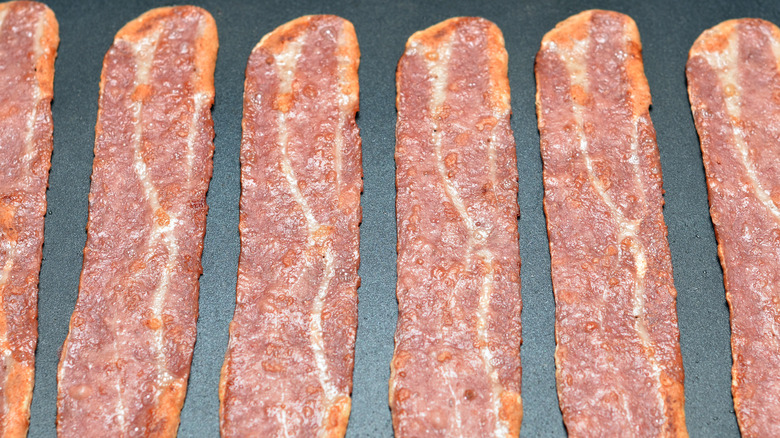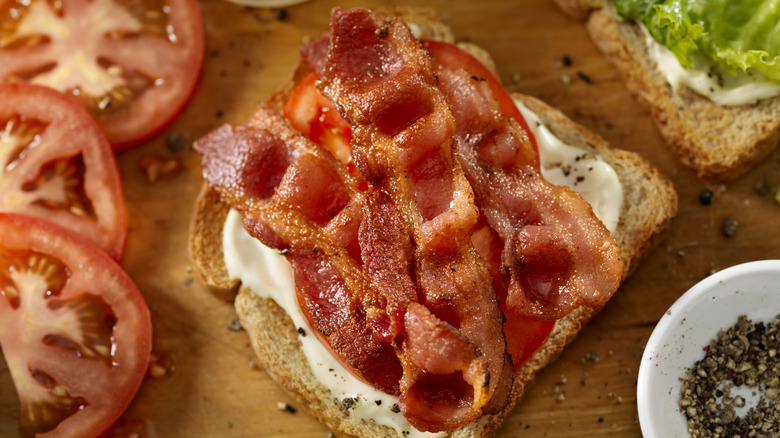The Unexpected Way Turkey Bacon Is Made
Let's not kid ourselves, here — turkey bacon doesn't quite hit like the real deal. But it does make an excellent alternative for those who can't eat pork or simply prefer poultry as a leaner option. It's salty, smoky, and flavorful, and while it typically doesn't have as much fat as pork bacon, if cooked right it can crisp up just as nicely.
Bacon, by definition, is fatty meat that typically comes from the belly or sides of the pig which is salt-cured and cut into those fryable strips we know so well. So naturally, you might assume that turkey bacon derives from a similar cut of meat along the sides of the bird. But as logical as that conclusion is, it's incorrect.
Turkey bacon is actually made of ground-up or chopped turkey, often both white and dark meat, that's taken from the thighs, breast, and even the skin of the bird. So how exactly does turkey bacon become so ... bacon-like? Here's everything you need to know.
How ground turkey becomes turkey bacon
While some turkey bacon brands will claim 100% thigh meat or breast meat in their bacon, most of the packages that you buy at the grocery store are made by mincing meat from various parts of the turkey, and many brands will use a mix of light and dark meat to mimic the marbled, streaky look of classic bacon.
Once the meat is ground up, it's seasoned and, similar to pork bacon, cured in a salt solution. The curing process is what technically makes it bacon; this typically involves a mixture of salt, sugar, and preservatives like sodium nitrate. Curing doesn't only help flavor the meat, but it also extends the product's shelf life and contributes to its coloring.
From there, the turkey meat is smoked or flavored to give it that quintessential bacon-like taste, and the mixture is pressed into those familiar bacon-shaped strips.
Is turkey bacon any healthier than pork bacon?
So what are the nutritional implications of the turkey-bacon-making process, and is it any better for you than traditional pork bacon? Poultry is generally considered healthier than pork or red meat, but that doesn't necessarily mean it's any better for you in bacon form. The bottom line is both products are processed meats, and neither is healthy.
Turkey is certainly a leaner meat, so turkey bacon does tend to have less fat and calories, but it also has less protein and more carbs than pork bacon — and often more added sugar to make up for its lack of natural flavor. It's the process of curing, preserving, and processing the meat that essentially outweighs any nutritional value with added sugar, sodium, and potentially harmful chemicals like nitrates or nitrites, which have been linked to an increased risk of cancer. This is true of both turkey bacon and pork bacon.
Nitrates occur naturally in some foods, so when you see bacon that's labeled "nitrate free" or "uncured", that means the nitrates used are coming from a natural source like celery juice. However, both natural and synthetic preservatives used to cure bacon can be harmful, so it's best to avoid both. That doesn't mean you can't indulge in the deliciousness of bacon from time to time — whether you prefer turkey or pork — but in terms of health implications, moderation is key.



